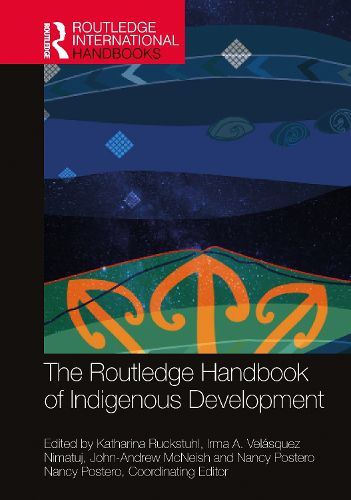Readings Newsletter
Become a Readings Member to make your shopping experience even easier.
Sign in or sign up for free!
You’re not far away from qualifying for FREE standard shipping within Australia
You’ve qualified for FREE standard shipping within Australia
The cart is loading…






This Handbook inverts the lens on development, asking what Indigenous communities across the globe hope and build for themselves. In contrast to earlier writing on development, this volume focuses on Indigenous peoples as inspiring theorists and potent political actors who resist the ongoing destruction of their livelihoods. To foster their own visions of development, they look from the present back to Indigenous pasts and forward to Indigenous futures.
Key questions:
How do Indigenous theories of justice, sovereignty, and relations between humans and non-humans inform their understandings of development?
How have Indigenous people used Rights of Nature, legal pluralism, and global governance systems to push for their visions?
How do Indigenous relations with the Earth inform their struggles against natural resource extraction?
How have native peoples negotiated the dangers and benefits of capitalism to foster their own life projects?
How do Indigenous peoples in diaspora and in cities around the world contribute to Indigenous futures?
How can Indigenous intellectuals, artists, and scientists control their intellectual property and knowledge systems and bring into being meaningful collective life projects?
The book is intended for Indigenous and non-Indigenous activists, communities, scholars, and students. It provides a guide to current thinking across the disciplines that converge in the study of development, including geography, anthropology, environmental studies, development studies, political science, and Indigenous studies.
$9.00 standard shipping within Australia
FREE standard shipping within Australia for orders over $100.00
Express & International shipping calculated at checkout
This Handbook inverts the lens on development, asking what Indigenous communities across the globe hope and build for themselves. In contrast to earlier writing on development, this volume focuses on Indigenous peoples as inspiring theorists and potent political actors who resist the ongoing destruction of their livelihoods. To foster their own visions of development, they look from the present back to Indigenous pasts and forward to Indigenous futures.
Key questions:
How do Indigenous theories of justice, sovereignty, and relations between humans and non-humans inform their understandings of development?
How have Indigenous people used Rights of Nature, legal pluralism, and global governance systems to push for their visions?
How do Indigenous relations with the Earth inform their struggles against natural resource extraction?
How have native peoples negotiated the dangers and benefits of capitalism to foster their own life projects?
How do Indigenous peoples in diaspora and in cities around the world contribute to Indigenous futures?
How can Indigenous intellectuals, artists, and scientists control their intellectual property and knowledge systems and bring into being meaningful collective life projects?
The book is intended for Indigenous and non-Indigenous activists, communities, scholars, and students. It provides a guide to current thinking across the disciplines that converge in the study of development, including geography, anthropology, environmental studies, development studies, political science, and Indigenous studies.